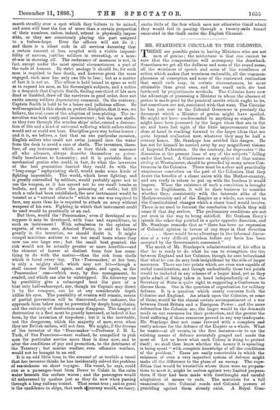A MECHANICAL SWORDFISH.
THE account of the 'Peacemaker,' the new submarine steel vessel which has just been tested in New York, published in the Daily News of Tuesday, is not pleasant reading for a country which relies mainly on its Fleet alike for its greatness and its wealth. The account is obviously truthful, and written by one who shared in the experimental trip ; and it is difficult to resist the conclusion that the Americans have invented a boat which may be developed into a most terrible instrument of submarine warfare. They have, in fact, created an artificial steel swordfish, which can dive out of sight, direct its course when forty feet under water, rise at will, and strike with the whole momentum of its weight, which may be five hundred tons, rushing at eight knots an hour against the bottom of any hostile vessel. The crew can keep under water for twenty- four hours, breathing an atmosphere renewed from a store of compressed air, and can work by the electric-light as readily as above the surface of the sea. The motive- power is steam, generated not by coal, but by "the caustic- soda process of producing heat." No ripple betrays the move- ment of the vessel, which was, in the trial trip, completely missed by anxious and acute spectators in New York Harbour, and she is, of course, wholly beyond the reach of shot, shell, or ram. Armed with a huge spike at her bow, she could sink any ship that floats, if she could hit it, and her captain has actually dived his vessel—" dive "is not an active verb, but what is to be done in presence of such novel conditions ?—under a big passenger steamer while the latter was running at fifteen knots an hour. They say the passengers cheered the "Little Terror ;" but that would not have been their impulse had they known her to be hostile. It is difficult to imagine a more formidable instrument, even if it proves, as we should expect, difficult for her to fasten torpedoes to the keels of men-of-war ; for six such boats used as rams, or with large torpedo-rams in front, would send any bombarding fleet to the bottom. The British Fleet might, for example, have been destroyed off the harbour of Alexandria without a shot being fired from the shore. Such an event would be equivalent to a great limitation of the power of fleets, for armies cannot land except under their protection, while the power of ships to bombard maritime cities, which at this moment so greatly affects the position of a great State like Italy, would be reduced to very small proportions. Ships cannot fire well moving at great speed, and speed would be the instrument relied on to evade the rushes of the mechanical swordfish. Of course, Britain herself would in presence of such a system be safer than ever ; but her power of ascending a river like the Yangtse in face of resistance would be finally at an end.
We suppose that new appliances, which have already almost baffled the torpedo—such as a new system of network, an ex- tension of the means for searching the depths by electric- light, or devices entirely new—will in the end suffice to diminish the value of the new method of marine defence ; but suppose for a moment they did not, would that terminate naval war ? The inventors of the new boat think it would, and with a certain grim irony natural to Americans, who catch the weird side of any incident nearly as quickly as they catch its incongruities, they have named her the 'Peacemaker,' believing, in fact, that in presence of such a danger sailors will not fight. Their theory has this much justification,—that soldiers and sailors, brave as they may be, are not exactly the heroes popular novelists describe. They will, under certain special impulses, face a certainty of death, as the soldiers did on the ' Birken- head ;' but, as a rule, they will only face an exaggerated risk. Very few troops can bear to be surrounded, still fewer will march steadily over a spot which they believe to be mined, and none will bear the loss of more than a certain proportion of their numbers, unless, indeed, retreat is physically impos- sible, or they are consciously playing the part assigned to a forlorn-hope. Even the officers will not do it ; and there is a silent code in all services decreeing that a certain amount of loss, coupled with a visible impossi- bility of success, justifies soldiers in retreating, or a man- of-war in sheering off. The endurance of massacre is not, in fact, except under the most special circumstances, a part of the code of honour. By strict analogy it should be, for each man is required to face death, and however great the mass engaged, each man has only one life to lose ; but as a matter of fact it is not so. The officer is held bound to spare as well as to expend his men, as his Sovereign's subjects, and a notice in a despatch that Captain Smith, finding one-third of his men dead or disabled, drew off the survivors in good order, does not excite among soldiers depreciatory comment. On the contrary, Captain Smith is held to be a brave and judicious officer. So well recognised is this check on perfect discipline, that it was, we believe, the real cause of the adoption of iron-plating. The in- novation was both costly and inconvenient ; but the new shells, as they tore through the wooden ships' sides, caused a destruc- tion of life and a kind of universal suffering which sailors either would not or could not bear. Discipline gave way before horror ; and it is, we believe, a fact that on one particular occasion, English sailors who could not swim jumped into the water from the deck to avoid a rain of shells. The inventors, there- fore, of any instrument which, as they think, can massacre all who advance, always describe themselves as poten- tially benefactors to humanity ; and it is probable that a mechanical genius who could, in fact, do what the inventors of the last generation fancied they could do with the " long-range " asphyxiating shell, would make some kinds of fighting impossible. The world, which loves fighting, and is greatly controlled by soldiers, would probably agree not to use the weapon, as it has agreed not to use small bombs as bullets, and not to allow the poisoning of wells ; but till such a rule had been established, the new instrument would be treated as a "natural obstacle" which no one was required to face, any more than he is required to attack an army without weapons of his own. Fighting in which that instrument could be used would be practically at an end.
But then, would the 'Peacemaker,' even if developed as we suppose it may be developed, with time and expenditure, be such an instrument With submission to the opinion of experts, of whom one, Admiral Porter, is said to believe greatly in the invention, we should doubt it. It might compel maritime nations to use ten small boats where they now use one large one ; but the small boat granted, the risk would not be actually greater or more horrible—and the element of horror as distinct from fear has some- thing to do with the matter—than the risk from shells which is faced every day. The Peacemaker,' at her beat, is only a mighty shell, which may not hit—though a shell cannot fire itself again, and again, and again, as the 'Peacemaker' can—which may, by fine management, be evaded, and which can also be outstripped. No discovery can by possibility give a submerged boat the pace of a boat only half-submerged, nor, though its Captain may direct it by the compass, can he at any considerable depth utilise his eyes. The possibility of evasion will remain, means of partial prevention will be discovered,—for instance, the approach from below may be prevented by deeply hung chains, and the certainty of destruction may disappear. The danger of destruction to a fleet must be greatly increased, as indeed it has been, by the invention of torpedoes ; but it is the inevitable, not the dangerous, which the majority of men, even when they are British sailors, will not face. We might, if the dreams of the inventor of the Peacemaker '—Professor J. H. L. Tuck, of San Francisco—were realised, be compelled to pick men for particular service more than is done now, and to alter the conditions of pay and promotion, to the detriment of the Treasury ; but marine warfare, even offensive warfare, would not be brought to an end.
It is an odd little item in the account of so terrible a vessel that her inventor thinks he has incidentally solved the problem of sea-sickness on short voyages. His vessel, he says, could run as a passenger-boat from Dover to Calais in the calm water beneath the surface waves ; and the passengers would sit unharassed by qualms just as they do now when passing through a long railway tunnel. That seems true ; and so great is the cpnfidence in ships, that such afjourney would, we fancy, excite little of the fear which men not otherwise timid admit they would feel in passing through a twenty-mile tunnel excavated in the chalk under the English Channel.

















































 Previous page
Previous page